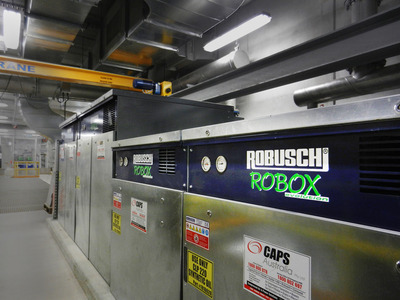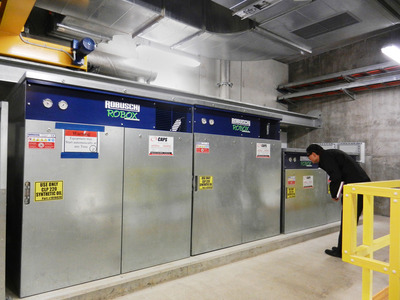Aeration for a cleaner, greener MCG
Wednesday, 27 March, 2013
As part of a multimillion-dollar project to build Victoria’s largest underground recycled water treatment plant at the iconic Melbourne Cricket Ground (MCG), Compressed Air and Power Solutions (CAPS) Australia was selected to supply aeration blowers for the facility.
CAPS supplied four Robuschi Robox positive displacement blowers which are used to aerate the water during treatment and to provide backwash to clean membrane filters. The lead contractor for the project, Tenix, supplied process, mechanical, civil, electrical, instrumentation and control design and construction.
The water treatment plant - jointly funded by the Melbourne Cricket Club (MCC) and the Victorian Government - produces 600 kL of Class A recycled water each day. This water is used to irrigate Yarra Park and Punt Road Oval and for cleaning and flushing the toilets at the MCG. The plant will reduce the MCG’s reliance on drinkable water by 50% and remove it from the list of Melbourne’s top 100 water users.
Eric Low, Blower Specialist with CAPS, said that during initial project discussions with Tenix, CAPS learnt that the blowers needed to fit in a limited space within a confined underground site. “I realised that the Robuschi blowers sold by CAPS would be ideal and proposed two models, the ES45/2P-11 KW and the ES85/3P-55 KW, for the aeration and the membrane systems of the MCG’s treatment plant,” he explained.

According to Daniel Haworth, Tenix Operations Supervisor for the MCG Recycled Water Treatment Plant, the blower solution had to fit in a very constrained narrow space. “Service access in our bunker is difficult, but the solution recommended by CAPS - with maintenance access via top and front panels - fitted our site’s needs perfectly,” Haworth said. “Another service feature of the blowers that we really appreciate is the inclusion of an automatic belt tensioning system which increased the operational time between servicing.”
The MCG treatment plant is one the first of its type in Victoria and was built underground to preserve valuable surface land use and park amenity. Everyone involved in the scheme wanted the design and construction of the plant to have minimum impact on the park and the public. Consultation during development involved local residents, regulatory authorities and members of the MCC. A major requirement was to not disturb the aesthetics of the existing parklands or reduce current parking availability.
“In the MCG plant, two Robuschi blowers are in operation 24 hours a day, with two in standby mode,” said Low.

The underground plant is contained in a 12 x 4.8 m diameter pumping station bored into the ground adjacent to the MCG. Innovative construction techniques utilising fibre-reinforced plastic for walkways reduced construction time as they could be cut to size on site and were much lighter than traditional metal construction materials. Associated infrastructure on the inlet side includes the sewer connection, diversion chamber and a rising main. Other infrastructure includes connections under the concourse to a pre-existing storage tank beneath the MCG. There are also connections to Punt Road storage, a pump station and sludge return gravity line downstream of the sewerage takeoff.
The water treatment involves screening and grit removal, biological treatment of the sewage and addition of chemicals to remove phosphate. Filtration methods used include membrane bioreactor (MBR) and ultrafiltration (UF) membrane systems. Disinfection of the water is by both ultraviolet (UV) and chlorination.
Low is proud that CAPS could provide a solution to meet the needs of this groundbreaking project. “Blowers are a common part of water treatment systems but it is unusual for them to be located in a bunker. The Robuschi blowers were the right equipment to meet the specific project requirements,” he said.
Data centres working to use water responsibly
Decisions that go into designing a new data centre will stay in place for many years to come, so...
Acoustic analysis helps protect a high-risk asset
A collaboration between Scottish Water and water solutions provider Xylem has netted a...
Future Made in Australia needs water to make it happen
Boosting technologies and manufacturing for a Future Made in Australia could get off to a healthy...









